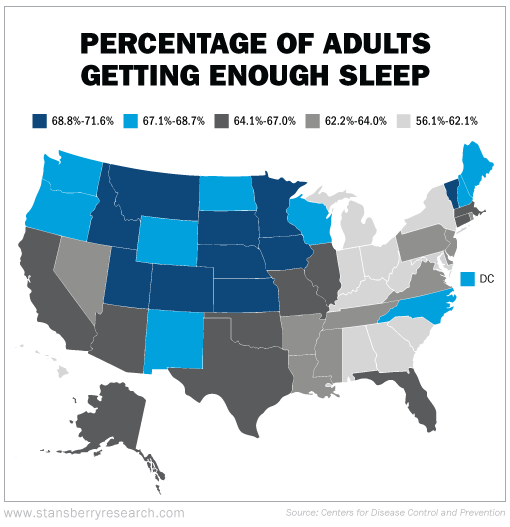It happens every year...
Every March, I see folks around the office dragging a little more than usual...
And this Sunday, the U.S. and 70 other countries around the world switch to daylight saving time.
That means your "regular" wake-up time is an hour earlier than normal... with the trade-off that there's an extra hour of sun at the end of the workday.
But there are serious health consequences surrounding the decision to mess with our clocks twice a year...
A study based on Michigan hospital admissions data found a 25% increase in the number of patients admitted to hospitals suffering from heart attacks on the Monday following the spring daylight saving time switch. Heart-attack risk fell 21% on the Tuesday after going back to standard time.
Another a study at the University of Alabama at Birmingham found a 10% increase in the risk of having a heart attack in the 48 hours following the March time change. Then, after the switch back to "regular time" in November, heart-attack risk decreased by 10%.
Back in 2016, a bigger study using more than 10 years' worth of data from Finland compared the week following a daylight saving time shift to the two weeks before and after...
The overall rate of stroke was 8% higher during the first two days after the time change. More important... cancer patients were 25% more likely to have a stroke right after the time shift than other periods, and the risk of stroke was 20% higher for folks aged 65 years or older.
Generally, a few days after the time change, risks return to normal as our bodies adapt to the new daily rhythm.
But because Americans are generally already sleep-deprived, changing the clocks in the spring may amplify these effects...
According to a survey from the U.S. Centers for Disease Control and Prevention, more than a third of Americans aren't getting enough sleep, putting themselves at risk of obesity, heart disease, and other issues.
Folks in Hawaii, Kentucky, and Maryland reported the worst sleep-deprived percentages, while my home state of Minnesota, as well as Colorado and South Dakota, had the highest number of folks who got seven hours or more of sleep. You can see a graphic below of the states, shaded according to reported numbers...

The good news... almost 75% of U.S. residents aged 65 and over reported getting seven hours or more of sleep, the highest of any age group. The lowest age group reporting was folks between 35 and 44 years old... with just 62% getting seven hours or more.
If you're having trouble sleeping, make sure to check out our recent issue about five ways to get a better night's sleep. The key is setting yourself up for a good night's sleep...
Keep your room dark, quiet, and cool. Get rid of electronics by your head and bed. And make sleep a routine. Go to bed at the same time each night. This helps your body know when to wind itself down. And when possible, avoid using an alarm clock to wake you up. Our bodies naturally wake us up when we've had enough sleep. This will leave you feeling better rested and more awake throughout the day.
Try it this weekend.
Getting around eight hours of sleep a night helps reduce stress, makes you three times less likely to catch a cold, helps you maintain a healthy weight, and reduces your risk of diseases like cancer and diabetes.
As for me, I'd like to stop messing with the clocks twice a year and simply shift permanently to daylight time... I love having a little bit of extra sun at the end of the day when I leave the office.
What do you do to get a good night's sleep? Let us know by writing to us here.
What We're Reading...
- Something different: Did lead lower the IQ of half of the U.S. population?
Here's to our health, wealth, and a great retirement,
Dr. David Eifrig and the Health & Wealth Bulletin Research Team
March 9, 2022
